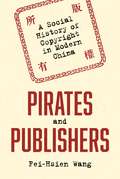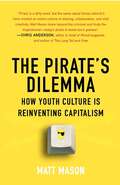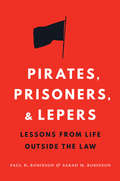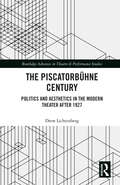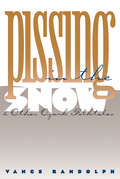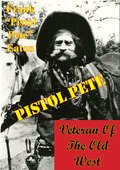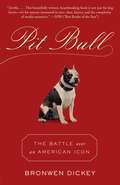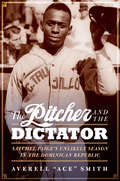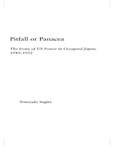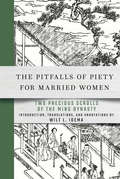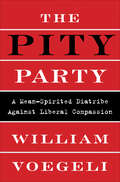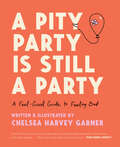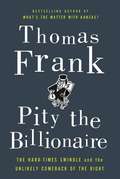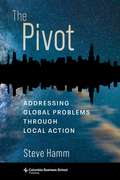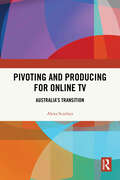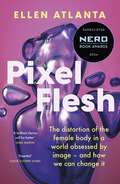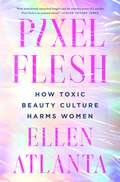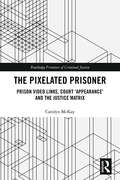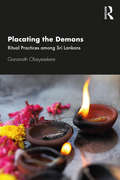- Table View
- List View
Pirates and Emperors, Old and New: International Terrorism in the Real World (Chomsky Perspectives Ser.)
by Noam ChomskyOne of the world&’s leading intellectuals &“raises provocative questions about U.S. diplomacy&” in a brilliant account of the workings of state terrorism (Maclean&’s). Pirates and Emperors, Old and New is a virtuoso exploration of the role of the United States in the Middle East that exposes how the media manipulates public opinion about what constitutes &“terrorism.&” Chomsky masterfully argues that appreciating the differences between state terror and nongovernmental terror is crucial to stopping terrorism and understanding why atrocities like the bombing of the World Trade Center and the killing of the Charlie Hebdo journalists happen. &“Disturbing reading and as always, indispensable.&” ―The Ubyssey Praise for Noam Chomsky &“Our greatest unraveller of accredited lies.&” —New Statesman &“Chomsky is a global phenomenon . . . perhaps the most widely read voice on foreign policy on the planet.&” —The New York Times Book Review &“There is no living political writer who has more radically changed how more people think in more parts of the world about political issues.&” ―Glenn Greenwald, journalist and author &“A truth-teller on an epic scale. I salute him.&” —John Pilger, journalist, writer, and filmmaker
Pirates and Publishers: A Social History of Copyright in Modern China (Studies of the Weatherhead East Asian Institute #6)
by Fei-Hsien WangA detailed historical look at how copyright was negotiated and protected by authors, publishers, and the state in late imperial and modern ChinaIn Pirates and Publishers, Fei-Hsien Wang reveals the unknown social and cultural history of copyright in China from the 1890s through the 1950s, a time of profound sociopolitical changes. Wang draws on a vast range of previously underutilized archival sources to show how copyright was received, appropriated, and practiced in China, within and beyond the legal institutions of the state. Contrary to common belief, copyright was not a problematic doctrine simply imposed on China by foreign powers with little regard for Chinese cultural and social traditions. Shifting the focus from the state legislation of copyright to the daily, on-the-ground negotiations among Chinese authors, publishers, and state agents, Wang presents a more dynamic, nuanced picture of the encounter between Chinese and foreign ideas and customs.Developing multiple ways for articulating their understanding of copyright, Chinese authors, booksellers, and publishers played a crucial role in its growth and eventual institutionalization in China. These individuals enforced what they viewed as copyright to justify their profit, protect their books, and crack down on piracy in a changing knowledge economy. As China transitioned from a late imperial system to a modern state, booksellers and publishers created and maintained their own economic rules and regulations when faced with the absence of an effective legal framework.Exploring how copyright was transplanted, adopted, and practiced, Pirates and Publishers demonstrates the pivotal roles of those who produce and circulate knowledge.
The Pirate's Dilemma: How Youth Culture Is Reinventing Capitalism
by Matt MasonIt started with punk. Hip-hop, rave, graffiti, and gaming took it to another level, and now modern technology has made the ideas and innovations of youth culture increasingly intimate and increasingly global at the same time. In The Pirate's Dilemma, VICE magazine's Matt Mason -- poised to become the Malcolm Gladwell of the iPod Generation -- brings the exuberance of a passionate music fan and the technological savvy of an IT wizard to the task of sorting through the changes brought about by the interface of pop culture and innovation. He charts the rise of various youth movements -- from pirate radio to remix culture -- and tracks their ripple effect throughout larger society. Mason brings a passion and a breadth of intelligence to questions such as the following: How did a male model who messed with disco records in the 1970s influence the way Boeing designs airplanes? Who was the nun who invented dance music, and how is her influence undermining capitalism as we know it? Did three high school kids who remixed Nazis into Smurfs in the 1980s change the future of the video game industry? Can hip-hop really bring about world peace? Each chapter crystallizes the idea behind one of these fringe movements and shows how it combined with technology to subvert old hierarchies and empower the individual. With great wit and insight -- and a cast of characters that includes such icons as the Ramones, Andy Warhol, Madonna, Russell Simmons, and 50 Cent -- Mason uncovers the trends that have transformed countercultural scenes into burgeoning global industries and movements, ultimately changing our way of life.
Pirates, Prisoners, and Lepers: Lessons from Life Outside the Law
by Paul H Robinson Sarah M. RobinsonIt has long been held that humans need government to impose social order on a chaotic, dangerous world. How, then, did early humans survive on the Serengeti Plain, surrounded by faster, stronger, and bigger predators in a harsh and forbidding environment? Pirates, Prisoners, and Lepers examines an array of natural experiments and accidents of human history to explore the fundamental nature of how human beings act when beyond the scope of the law. Pirates of the 1700s, the leper colony on Molokai Island, prisoners of the Nazis, hippie communes of the 1970s, shipwreck and plane crash survivors, and many more diverse groups—they all existed in the absence of formal rules, punishments, and hierarchies. Paul and Sarah Robinson draw on these real-life stories to suggest that humans are predisposed to be cooperative, within limits. What these “communities” did and how they managed have dramatic implications for shaping our modern institutions. Should today’s criminal justice system build on people’s shared intuitions about justice? Or are we better off acknowledging this aspect of human nature but using law to temper it? Knowing the true nature of our human character and our innate ideas about justice offers a roadmap to a better society.
The Piscatorbühne Century: Politics and Aesthetics in the Modern Theater After 1927 (Routledge Advances in Theatre & Performance Studies)
by Drew LichtenbergThis study of the Piscatorbühne season of 1927–1928 uncovers a vital, previously neglected current of radical experiment in modern theater, a ghost in the machine of contemporary performance practices. A handful of theater seasons changed the course of 20th- and 21st-century theatre. But only the Piscatorbühne of 1927–1928 went bankrupt in less than a year. This exploration tells the story of that collapse, how it predicted the wider collapse of the late Weimar Republic, and how it relates to our own era of political polarization and economic instability. As a wider examination of Piscator’s contributions to dramaturgical and aesthetic form, The Piscatorbühne Century makes a powerful and timely case for the renewed significance of the broader epic theater tradition. Drawing on a rich archive of interwar materials, Drew Lichtenberg reconstructs this germinal nexus of theory and praxis for the modern theatre. This book will be of great interest to students and scholars in theatre, performance, art, and literature.
Pissing in the Snow and Other Ozark Folktales
by Vance RandolphThe well-known Ozark folklorist gathers together bawdy tales, previously considered unprintable, that provide insight into the region's rich exotic narrative tradition.
Pissing on Demand: Workplace Drug Testing and the Rise of the Detox Industry (Alternative Criminology #18)
by Ken D. TunnellDrug testing has become the norm in many workplaces. In order to get a job, potential employees are required to provide their urine for testing. Pissing on Demand examines this phenomenon along with the resulting rise of the anti-drug testing movement, or the "detox industry," that works to beat these tests. Strategies include over-the-counter products like "body flushers" that sound innocent but are really designed to mask the presence of illegal drugs to kits advertised in pro-drug publications like High Times that make no bones about their real purpose. The first exposé of the detox industry in all its manifestations, this book is required reading for anyone concerned with social control, privacy, and workers' rights.
Pistol Pete, Veteran Of The Old West
by Frank “Pistol Pete” Eaton"The autobiography of Frank "Pistol Pete" Eaton, a one-time cowboy, scout, Indian fighter, trail rider, and Deputy United States Marshall Frank Eaton died at his home in Perkins, Oklahoma, at the age of 98. As a youth, Frank Eaton avenged his father's death when he was shot in cold blood by the Campseys and Ferbers, former Confederates who called themselves Regulators. Eaton witnessed his father's murder in 1868. In the intervening 19 years, Frank finished the job of gunning down the last of his father's murderers. At the age of 15, the post commander at Fort Gibson. Indian Territory, dubbed Frank Eaton "Pistol Pete" when he out shot everyone at the fort. In 1923, "Pistol Pete" gave permission for Oklahoma A & M College to use his photograph in a design of a college emblem. Today "Pistol Pete" is the model for the "Cowboy" caricature at Oklahoma State University, New Mexico State University. and the University of Wyoming. Frank Eaton, in Pistol Pete-Veteran Of The Old West, tells about the constant struggle between law and crime and the result of crime which in those times ended with a rope or bullet. His memoirs offer a colorful, humorous, violent, and moving picture of law and lawlessness in Indian Territory."-Print ed.
Pit Bull: The Battle over an American Icon
by Bronwen DickeyThe hugely illuminating story of how a popular breed of dog became the most demonized and supposedly the most dangerous of dogs--and what role humans have played in the transformation. When Bronwen Dickey brought her new dog home, she saw no traces of the infamous viciousness in her affectionate, timid pit bull. Which made her wonder: How had the breed--beloved by Teddy Roosevelt, Helen Keller, and Hollywood's "Little Rascals"--come to be known as a brutal fighter? Her search for answers takes her from nineteenth-century New York City dogfighting pits--the cruelty of which drew the attention of the recently formed ASPCA--to early twentieth-century movie sets, where pit bulls cavorted with Fatty Arbuckle and Buster Keaton; from the battlefields of Gettysburg and the Marne, where pit bulls earned presidential recognition, to desolate urban neighborhoods where the dogs were loved, prized--and sometimes brutalized. Whether through love or fear, hatred or devotion, humans are bound to the history of the pit bull. With unfailing thoughtfulness, compassion, and a firm grasp of scientific fact, Dickey offers us a clear-eyed portrait of this extraordinary breed, and an insightful view of Americans' relationship with their dogs.From the Hardcover edition.
The Pitcher and the Dictator: Satchel Paige's Unlikely Season in the Dominican Republic
by Averell Ace" SmithSoon after Satchel Paige arrived at spring training in 1937 to pitch for the Pittsburgh Crawfords, he and five of his teammates, including Josh Gibson and Cool Papa Bell, were lured to the Dominican Republic with the promise of easy money to play a short baseball tournament in support of the country’s dictator, Rafael Trujillo. As it turned out, the money wasn’t so easy. After Paige and his friends arrived on the island, they found themselves under the thumb of Trujillo, known by Dominicans for murdering those who disappointed him. In the initial games, the Ciudad Trujillo all-star team floundered. Living outside the shadow of segregation, Satchel and his recruits spent their nights carousing and their days dropping close games to their rivals, who were also stocked with great players. Desperate to restore discipline, Trujillo tapped the leader of his death squads to become part of the team management. The American players believed they might be lined up and shot if they lost the tournament. When Paige’s team ultimately rallied to win, it barely registered with Trujillo, who a few months later ordered the killings of fifteen thousand Haitians at the border between Haiti and the Dominican Republic. Paige and his teammates returned to the states to face banishment from the Negro Leagues, but ironically they barnstormed across America wearing their Trujillo All-Stars uniforms.The Pitcher and the Dictator is an extraordinary story of race, politics, and some of the greatest baseball players ever assembled, playing high-stakes baseball in support of one of the Caribbean’s cruelest dictators. For more information about The Pitcher and the Dictator, visit thepitcherandthedictator.com.
Pitfall or Panacea: The Irony of U.S. Power in Occupied Japan, 1945-1952
by Yoneyuki SugitaThe main purpose of this book is to shed light on the limitations of the American hegemony in occupied Japan. Previous studies share the assumption that the United States was in a near-monopoly position to shape the postwar development in Japan as well as in the Asia-Pacific region. The book goes on to modify the prevailing view that American hegem
The Pitfalls of Piety for Married Women: Two Precious Scrolls of the Ming Dynasty
by Wilt L. IdemaThe Pitfalls of Piety for Married Women shows how problematic the practice of Buddhist piety could be in late imperial China. Two thematically related "precious scrolls" (baojuan) from the Ming dynasty, The Precious Scroll of the Red Gauze and The Precious Scroll of the Handkerchief, illustrate the difficulties faced by women whose religious devotion conflicted with the demands of marriage and motherhood.These two previously untranslated texts tell the stories of married women whose piety causes them to be separated from their husbands and children. While these women labor far away, their children are cruelly abused by murderous stepmothers. Following many adventures, the families are reunited by divine intervention and the evil stepmothers get their just deserts. While the texts in The Pitfalls of Piety for Married Women praise Buddhist piety, they also reveal many problems concerning married women and mothers.Wilt L. Idema's translations are preceded by an introduction that places these scrolls in the context of Ming dynasty performative literature, vernacular literature, and popular religion. Set in a milieu of rich merchants, the texts provide a unique window to family life of the time, enriching our understanding of gender during the Ming dynasty. These popular baojuan offer rare insights into lay religion and family dynamics of the Ming dynasty, and their original theme and form enrich our understanding of the various methods of storytelling that were practiced at the time.
The Pity Party: A Mean-Spirited Diatribe Against Liberal Compassion
by William VoegeliWhen liberals don't have reason, authority, or the American people on their side, they turn to the one thing they never run out of: Pity.For decades, conservatives have chafed at being called "heartless" and "uncaring" by liberals who maintain that our essential choice as a nation is between the politics of kindness and the politics of cruelty. In The Pity Party, political scientist William Voegeli turns the tables on this argument, making the case that "compassion" is neither the essence of personal virtue nor the ultimate purpose of government. Over the years, liberals have built a remarkable edifice of government programs that are justified by appeals to compassion: Head Start, immigration reform, gun control, affirmative action, and entitlements, to name only some. As Voegeli amply demonstrates, the liberals who promote these massive programs are weirdly indifferent as to whether they succeed. Instead, when the problems they are intended to solve fail to disappear, liberals double down, calling for yet more programs and ever greater expenditures in the name of "compassion." Meanwhile, conservatives who challenge the effectiveness of these programs are slandered as "heartless right-wingers." Yet rather than challenge this tendentious liberal argument, the many conservatives it intimidates feel it necessary to insist that they really do "care." However, liberal compassion's good intentions consistently fail to translate into good results. Voegeli walks the reader through a plethora of programs that have become battlefields between conservatives fighting for more efficiency and liberals fighting for more budget-busting federal programs to address an ever-expanding catalog of social ills. Along the way, he explains the underpinnings of the liberal philosophy that reinforce this misapplied ideal and shows why today's self-described compassionate liberals are ultimately unfit to govern.
A Pity Party Is Still a Party: A Feel-Good Guide to Feeling Bad
by Chelsea Harvey GarnerMost of us try to avoid feeling sad, but in this candid, comical, and deeply-felt book, therapist Chelsea Harvey Garner doesn’t just argue that the future will be brighter if we learn to enjoy the unenjoyable and support each other when the vibes aren’t so good, she also shows us how. What if all the advice we’ve received about “looking on the bright side” is wrong? What if sadness is actually the key to happiness, and can even be . . . fun? Garner is here to make that case. In this feel-good guide to feeling bad, she claims it’s not enough for us to tolerate hard feelings. We need to embrace them. We need to let them show by crying with others. Often. In public.Playful, at times irreverent, but always sincere, Garner is the grown-up Miss Frizzle for the therapy generation. She believes that if we want to build a world where mental health is the norm, we have to lean into connection and count on each other, even—and perhaps especially—at our worst.Through anecdotes about her own hardships and insights gained in her clinical practice, Garner illuminates the power (and embarrassment) of opening up. Featuring solo exercises, group activities, and journal prompts alongside personal essays, she invites us to see emotions in a new light and engage with them in a healthier way. A Pity Party is Still a Party helps us find the silver lining, but only after we’ve played in the rain.
Pity the Billionaire: The Hard-Times Swindle and the Unlikely Comeback of the Right, 1st edition
by Thomas FrankFrom the bestselling author of What’s the Matter with Kansas?, this witty and highly provocative book asks a simple question: How is it possible that the disastrous collapse of the free market economy in 2008 could have heralded a popular revival—of the right? In Pity the Billionaire, a brilliant, funny, and disturbing tour de force, Thomas Frank analyzes the sleight of hand involved in the right’s resurgence—all the upside-down grievances that have transformed economic suffering into valentines for the rich and powerful. This great chronicler of American paradox dissects the contradictions at the heart of the country’s politics, and in this “dazzling” book once again shows himself as "one of the best left-wing writers America has produced" (The Guardian).
The Pivot: Addressing Global Problems Through Local Action
by Steve HammWhen the world reemerges from the COVID-19 pandemic, it seems likely that it will have transformed irrevocably. Can societies already reeling from climate change, income inequality, and structural racism change for the better? Does the shock of the pandemic offer an opportunity to pivot to a more sustainable way of life?Early in the crisis, a global volunteer collaboration called Pivot Projects was formed to rethink how the world works. Some members are experts in the sciences and the humanities; others are environmental activists or regular people who see themselves as world citizens. In The Pivot, the journalist Steve Hamm—who embedded in the enterprise from the start—explores their efforts and shows how their approach provides a model for achieving systemic change. Chronicling the group’s progress along an uncharted path, he shows how people with a variety of skills and personalities collaborate to get things done. Through their work, Hamm examines some of today’s most important technologies and concepts, such as systems thinking and modeling, complexity theory, artificial intelligence, and new thinking about resilience. The book features vivid, informal profiles of a number of the group’s members and brings to life the excitement and energy of dynamic, smart people trying to change the world.Part journal of a plague year and part call to action, The Pivot tells the remarkable story of a collaborative experiment seeking to make the world more sustainable and resilient.
Pivotal Voices, Era of Transition: Toward a 21st Century Poetics
by Rigoberto GonzalezPivotal Voices, Era of Transition gathers Rigoberto González’s most important essays and book reviews, many of which consider the work of emerging poets whose identities and political positions are transforming what readers expect from contemporary poetry. A number of these voices represent intersectional communities, such as queer writers of color like Natalie Díaz, Danez Smith, Ocean Vuong, and Eduardo C. Corral, and many writers, such as Carmen Giménez Smith and David Tomás Martínez, have deep connections to their Latino communities. Collectively, these writers are enriching American poetry to reflect a more diverse, panoramic, and socially conscious literary landscape. Also featured are essays on the poets’ literary ancestors—including Juan Felipe Herrera, Alurista, and Francisco X. Alarcón—and speeches that address the need to leverage poetry as agency. This book fills a glaring gap in existing poetry scholarship by focusing exclusively on writers of color, and particularly on Latino poetry. González makes important observations about the relevance, urgency, and exquisite craft of the work coming from writers who represent marginalized communities. His insightful connections between the Latino, African American, Asian American, and Native American literatures persuasively position them as a collective movement critiquing, challenging, and reorienting the direction of American poetry with their nuanced and politicized verse. González’s inclusive vision covers a wide landscape of writers, opening literary doors for sexual and ethnic minorities.
Pivoting and Producing for Online TV: Australia's Transition
by Alexa ScarlataThe introduction and diffusion of international subscription video-on-demand (SVOD) services in the 2010s represented the most significant disruption of established national broadcast and pay-TV ecologies in their long history. Using an in-depth Australian case study, this book narrates this profound period of proliferation. It also considers how incumbent commercial networks, pay-TV providers and public service broadcasters developed into online TV providers, albeit in assorted ways. In so doing, it conceives of the early impact of online TV (2015–2020) more broadly and acknowledges the role of both new and old TV players.The industry-wide shift towards online TV over this period also impacted existing television drama production cultures. SVOD services provided a fruitful avenue for the distribution of existing archives and slowly began to support the production of new Australian content with an increasingly global focus. However, the formal arrival of online TV certainly did not usher in the boom in original local television drama many anticipated. Pivoting and Producing for Online TV: Australia's Transition advances the macro-analysis of television production strategies.This book will be useful to students and researchers interested in media, film, and cultural studies.
Pixel Flesh: How Toxic Beauty Culture Harms Women
by Ellen AtlantaA generation defining exposé of toxic beauty culture in our digital age and how it is harming women We are living in a new age of beauty. With advancements in cosmetic surgery, augmented reality face filters, photo editing apps, and exposure to more images than we were ever meant to see, we have the ability to craft ourselves in whichever way we please. We pinch, pull, squeeze, tweeze, smooth and slice ourselves beyond recognition. But is modern beauty culture truly empowering? Are we really in control?In every era there is a beauty ideal. Yet, today the pressure to attain and retain the perfect body is compounded by our addiction to sharing every angle of ourselves online. In an age of influencers and social media, modern beauty culture is all-consuming and it is hurting the lives of women around the world. From Love Island to lip filler, blackfishing to the beauty tax, Ellen Atlanta reconfigures our understanding of women's relationship with beauty culture to account for the digital age. Providing an eye-opening account of the realities young women face under a dominant industry, Pixel Flesh unmasks the absurdities of the dystopia we find ourselves living in. Both a rallying cry and a refusal to suffer in silence, this is a vital insight into what it feels like to exist as a woman in a digitally obsessed world.
Pixel Flesh: How Toxic Beauty Culture Harms Women
by Ellen AtlantaA generation defining exposé of toxic beauty culture in our digital age and how it is harming women We are living in a new age of beauty. With advancements in cosmetic surgery, augmented reality face filters, photo editing apps, and exposure to more images than we were ever meant to see, we have the ability to craft ourselves in whichever way we please. We pinch, pull, squeeze, tweeze, smooth and slice ourselves beyond recognition. But is modern beauty culture truly empowering? Are we really in control?In every era there is a beauty ideal. Yet, today the pressure to attain and retain the perfect body is compounded by our addiction to sharing every angle of ourselves online. In an age of influencers and social media, modern beauty culture is all-consuming and it is hurting the lives of women around the world. From Love Island to lip filler, blackfishing to the beauty tax, Ellen Atlanta reconfigures our understanding of women's relationship with beauty culture to account for the digital age. Providing an eye-opening account of the realities young women face under a dominant industry, Pixel Flesh unmasks the absurdities of the dystopia we find ourselves living in. Both a rallying cry and a refusal to suffer in silence, this is a vital insight into what it feels like to exist as a woman in a digitally obsessed world.
Pixel Flesh: How Toxic Beauty Culture Harms Women
by Ellen AtlantaOne of Book Riot's 10 Best New Nonfiction Book Releases of August 2024A generation-defining exposé of toxic beauty culture—from Botox and Instagram filters to lip flips and editing apps—and the realities of coming of age onlineWe live in a new age of beauty. With advancements in cosmetic surgery, walk-in treatments, augmented reality face filters, photo editing apps, and exposure to more images than ever, we have the ability to craft the image we want everyone to see. We pinch, pull, squeeze, tweeze, smooth and slice ourselves beyond recognition. But is our beauty culture truly empowering? Are we really in control?In Pixel Flesh, Ellen Atlanta holds a mirror up to our modern beauty ideal, as well as the pressure to present a perfect image, to live in an age of constant comparison and curated feeds. She weaves in her personal story with others’ to reconfigure our obsession with the cult of beauty and explore the reality of living in a world of paradoxes: we know our standards are unhealthy, but understand it’s a way to succeed. We resent social media but continue to scroll. We know digital beauty is artificial, but we still strive for it.From Love Island to lip filler, blackfishing to the beauty tax, Pixel Flesh is a fascinating account of what young women face under a dominant industry. Nuanced, unflinching, and razor sharp, this book unmasks the absurdities of the standards we suddenly find ourselves upholding, and acts as a rallying cry and a refusal to suffer in silence, forming the definitive book about what it truly feels like to exist as a woman today.
The Pixelated Prisoner: Prison Video Links, Court ‘Appearance’ and the Justice Matrix (Routledge Frontiers of Criminal Justice)
by Carolyn McKayTechnological linkages between justice and law enforcement agencies are radically altering criminal process and access to justice for prisoners. Video links, integral to an increasingly networked justice matrix, enable the custodial appearance of prisoners in remote courts and are becoming the dominant form of court appearance for incarcerated defendants. This book argues that the incorporation of such technologies into prisons is not without consequence: technologies make a critical difference to prisoners’ experiences of criminal justice. By focusing on the prison endpoint and engaging with the population most affected by video links – the prisoners themselves – this book interrogates the legal and conceptual shifts brought about by the technology’s displacement of physical court appearance. The central argument is that custodial appearance has created a heightened zone of demarcation between prisoners and courtroom participants. This demarcation is explored through the transformed spatial, corporeal and visual relationships. The cumulative demarcations challenge procedural justice and profoundly recompose prisoners’ legal experiences in ways not necessarily recognised by policy-makers.
Pizza Bomber: The Untold Story of America's Most Shocking Bank Robbery
by Jerry Clark Ed PalattellaReporter Palattella and lead FBI investigator Clark present this gripping account of the nationally infamous 2003 bank robbery by pizza delivery man Brian Wells. Includes photos. Available in a tall Premium Edition. Original.
Placating the Demons: Ritual Practices among Sri Lankans
by Gananath ObeyesekereThis book critically examines dominant ceremonial practices in Sri Lanka. It presents key ideas and symbolic systems that exist to this day, in similar shapes or in different guises. It looks at issues such as misfortunes caused by demons (yaksa dosa), an important ceremonial practice known as the puna-yāgaya, ideas pertaining to spirit possession, trance, and mediums. It also deals with classical Ayurvedic theories of disease, urban ceremonial practices such as cases of the apotheoses from demon to divinity, as well as multiple forms of Buddhist ceremonial practices that are part of the Sri Lankan consciousness and have found their way into public cultural performances in Sri Lanka. As a comprehensive volume on ceremonial practices in Sri Lanka, this work will be useful for scholars and researchers in cultural studies, sociology, social-anthropology, and particularly those interested in myths and rituals in South Asia.

